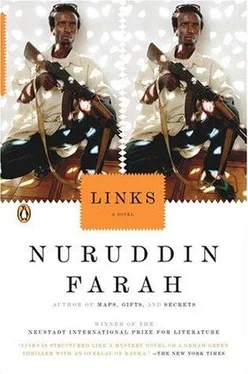Jeebleh emerged after a while from his unclear thinking, and sighed with the confidence of a young colt. “Would you have someone in mind for such a job?”
“I would.”
Kaahin’s name came to Jeebleh’s mind. “Like who?”
Dajaal wouldn’t commit himself. “I can think of out-of-work former colleagues of mine who’ll do the job quietly, efficiently, and cheaply, and who’ll spare one all the gory details having to do with the disposal of bodies and evidence linking one to the deed.” So Dajaal not only knew what Jeebleh wanted him to do, but had given thought to the details like a professional assassin.
“How much?” Jeebleh maintained his confidence.
“I’ll come back to you on that,” Dajaal said.
The sun slanted at Jeebleh from the west, and the sand stirred by his feet rose up and caught on his hairy shins: the scratchy edge of his sarong felt drier. He fiddled with the hat, his fingers upsetting its comfortable fit. “Are you carrying a firearm?” he asked.
“I never go anywhere without one nowadays. Without it I feel naked, unsafe. As it happens, I’m carrying two. Now, may I ask, what do you care about firearms?”
“Could you lend me one?”
Dajaal stopped walking and bent down. He pulled out a revolver he had been wearing strapped to his shin, and offered it simply: “Here!”
Jeebleh took it without hesitation. The revolver felt heavier to him than the machine gun he had held on the way to the cemetery. Fear gathered in his throat, choking him. Before walking on, he admired the weapon, then hid it under his sweat-drenched shirt.
It froze his commoner blood to bear the blood-royal elegance of a machine built to kill at the touch of a trigger. The changes wrought in his behavior from the moment Af-Laawe’s muscleman had prodded him with that needle were enormous. Even though he had contemplated vengeance on Caloosha, he never thought the day would come when he, a peace-loving man, would resort to using a deadly weapon to settle scores.
“The second job you want done?” Dajaal asked.
“This is a lot more pedestrian.” Jeebleh explained the job he had in mind for the mason.
Dajaal asked, “When do you need him to start?”
“I’d say let him start right away.”
“Leave both jobs with me, then.”
Suddenly they heard a stir nearby. A mob shouting, “Thief, catch him!” was chasing a scraggly youth. Blind with fear, the boy ran smack into Jeebleh and almost knocked him over. The mob stopped a short distance away. The ringleader — a very well fed merchant from the market, sprinkled all over with his wares of flour, rice, and sugar — approached with his arms extended, saying, “Hand over the thief, then.”
The thin youth had his mouth full of the food he had apparently stolen, which he was now busy chewing. In his right hand was half of a roll, out of which a piece of meat protruded, like a dead tongue. Eyes as large as his fright, the youth begged in a low voice, “I am hungry, please!”
“How much did the sandwich cost?” Jeebleh asked.
“Hand him over! Hand him over!” the mob chanted.
“I’ll pay for what he’s eaten, so you can let him go free.” Jeebleh looked from the well-fed man to the scraggly youth, and then at the agitated mob, and finally at Dajaal, who stayed out of it, but, as ever, was prepared for any eventuality. Jeebleh addressed the fat merchant: “What’s your problem? I am prepared to pay for his sandwich.”
“He always steals food, runs off, and never pays!” the trader said. “Hand him over and we’ll teach him a lesson. And don’t waste our time.”
“The boy is hungry, that is why he steals!”
The mob moved in on Jeebleh threateningly. Now cowed, he brought out a dollar’s worth of the local currency, and made as though to give it to the trader, who scoffed at the idea of allowing the youth to go free. It was then that Jeebleh lifted his shirt and showed that he had a revolver — and immediately he discerned a change in the mood of the mob, which started to disperse. The trader accepted the money, and the youth scuttled across the road, vanishing into the dust he stirred.
“I’ll be damned!” Dajaal said.
DAJAAL LEFT JEEBLEH IN FRONT OF THE BARBERSHOP, AGREEING TO RETURN in an hour or so — he would get in touch with a mason he knew, in the meanwhile — and take him back to Bile’s apartment.
Jeebleh walked into the shop with the air of a man who, armed and knowing no fear, was prepared to meet his destiny. The three barbers stopped snipping, and the clients, some waiting on benches against a wall, stared at the stranger entering. He took a seat.
There were seven other customers: one having his hair cut, two having their moustaches and sideburns trimmed, and the rest waiting. Those in the chairs had limp towels wrapped around their throats. On the floor were curls of hair in impossible postures, waiting to be swept away. Even though he couldn’t tell who the men in the shop were, he sensed something earthy in their voices. They had been raised probably in the semi-arid hamlets of the central regions, where many of StrongmanSouth’s supporters hailed from, and where he recruited a large number of his militiamen.
A cassette of Somali music was playing. Jeebleh enjoyed listening to it. Did the fact that people were eating in restaurants and having their hair cut at the barbers’ mean that the most deadly phase of the civil war had ended? The fact that one could pursue these activities without fear suggested a degree of normalcy. Ostensibly, no one in the shop was armed. Certainly, everyone had looked in his direction with ferocious intensity and suspicion when Jeebleh entered, but no one had pointed a gun at him.
One of the barbers beckoned to him with the sweeping gesture of a Mogadiscian welcoming you to his home, indicating a chair vacated by a man whose hair and moustache he had just trimmed to perfection. As Jeebleh took the chair, a scruffy youth came in with a tray holding several metal cups and offered a cup to each of the customers and the barbers. He then began to sweep up the hair on the floor. The men waiting their turn read newspapers and sipped their tea. When the youth was done, he went to Jeebleh’s barber for payment, and then was gone, taking the empty tray with him.
Jeebleh just tasted his tea, didn’t drink it; not only was it too hot, but it was also sugary. He mused that the youth had brought the tray of tea, and the barber had paid for it; the boy trusted he would get paid, and that he would find the cups when he returned later. These small things represented society’s gradual recovery from the terrible trauma of war. Was the worst now over?
“How would you like yours done?” the barber had meanwhile asked.
“I’d like it cut very short.” Jeebleh placed the conical hat in front of him where he could see it, so he wouldn’t forget.
The barber brought out an electric clipper from under a table, where it had hung on a hook. He adjusted the blade and switched it on, then tested it against his open palm.
“I’d prefer that you use scissors and a comb, please,” Jeebleh told him.
The barber started cutting with avuncular charm, and the two of them talked in the soft tones of men confiding in each other. They spoke in general terms, eventually touching on the changes in the clientele of the shop, which, the barber explained, had been the rendezvous for the city’s cosmopolitans in the days before the civil war.
Then, out of the blue, the barber asked, “Are you a friend of Bile’s?”
“Do you know him?” Jeebleh asked.
“He’s one of my customers.”
“What about Raasta and Makka?”
“I remember them coming here with him. Have you met them yourself?”
“I’ve seen photographs of them at Bile’s.”
Читать дальше












